SWEDISH SOUTH ASIAN STUDIES NETWORK
Report from a visit to Kalmar University, 15 February 2007
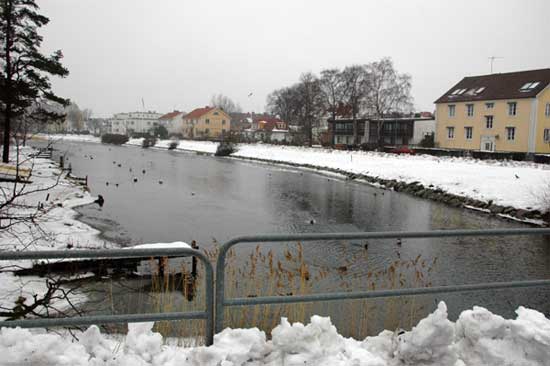 Staffan
Lindberg and Lars Eklund from SASNET went to Kalmar on the Baltic
Coast in order to meet researchers involved in the SASNET network,
both at the Dept. of Technology (Ingenjörshögskolan)
and at the Baltic Business School. It was a grey day in mid-February
2007, characterised by slushy weather since the snow from a previous
cold period was now melting away.
Staffan
Lindberg and Lars Eklund from SASNET went to Kalmar on the Baltic
Coast in order to meet researchers involved in the SASNET network,
both at the Dept. of Technology (Ingenjörshögskolan)
and at the Baltic Business School. It was a grey day in mid-February
2007, characterised by slushy weather since the snow from a previous
cold period was now melting away.
 The University of Kalmar was officially established
in 1977. It originated from the teacher programme and expanded
primarily into the technological and natural science sectors. Today,
the University has a range of almost 50 degree programmes and over
300 courses to offer within natural sciences, technology, computing,
economics, tourism, social science, the humanities, behavioural
science, health care, maritime subjects, design and media and teacher
training.
The University of Kalmar was officially established
in 1977. It originated from the teacher programme and expanded
primarily into the technological and natural science sectors. Today,
the University has a range of almost 50 degree programmes and over
300 courses to offer within natural sciences, technology, computing,
economics, tourism, social science, the humanities, behavioural
science, health care, maritime subjects, design and media and teacher
training.
The University
has been in an expansive phase for a long time now and has 9 500
students.
Department of Technology
– see also http://www.sasnet.lu.se/teknikkalmar.html
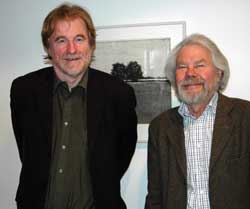 |
| Professor William Hogland with Staffan Lindberg, SASNET. |
We had a meeting with Prof. William
Hogland in the
nice spacious four-storied building that currently houses the Dept.
of Technology, just beside the main building of Kalmar University
at Norra Vägen.
Prof. Hogland has
been working with waste management and recovery since the late
1980’s,
first in the Dept.
of Water Resources Engineering, Lund University, and then at
Kalmar University. In 1999 he was awarded the professoral chair
of Environmental Engineering, and since 2003 he has been involved
in a research project about landfills in Kathmandu Valley, Nepal,
with colleagues at Lund University and Kristianstad University
(in the so-called LAQUA group), and Tribhuvan University and organisations
in Nepal such as the Development Network, DNet. Staffan and Lars
met representatives of DNet in Kathmandu in December 2005. Read
a report from the meeting.
Shortly thereafter an International conference on Sustainable
Solid Waste Management in Developing Countries, called ”For a Better
Tomorrow” was held in Kathmandu.
The conference – the first one to focus on local waste management
issues in Nepal – was organized by DNet, on behalf of Kathmandu
University and the LAQUA group. The conference was funded by the International
Foundation for Science, ISF. More information.
While at Lund University, Prof. Hogland was also engaged in organising educational training programmes for professionals working with solid waste management in developing countries. Programmes being funded by the Swedish International Development Cooperation Agency, Sida. These courses are still run, but now by Chalmers University of Technology in Göteborg.
At Kalmar University, he plans for a development
of the Bachelors programme in International
Environmental Engineering for Eco-cyclic Systems ("kretsloppsingenjörsutbildning”)
into a Masters and PhD programme. The plans are worked out in collaboration
with the School of Environment,
Resources and Development (SERD)
at the Asian Institute of Technology (AIT) in Pathumthani, Thailand,
and include 3 years BSc courses in Kalmar, followed by 2 years
MSc and 3 years of PhD training. As Kalmar University (like other
Swedish university colleges) currently has no right to organise
such a Masters programme, this will be carried out at AIT in Thailand.
A contract regarding this has been signed.
The collaboration with AIT in Bangkok also extends to joint conferences.
In September 2007, the Centre for Environmental Studies, Anna University,
Chennai, India, organises an International conference on Sustainable
Solid Waste Management, in association with AIT, and with financial
support from Sida. William Hogland is a member of the organizing
committee. More information
about the Chennai conference.
At the University of Kalmar, Prof. William Hogland has been responsible
for organising the so-called Kalmar Eco-tech conferences since
1997. The tenth anniversary Eco-tech Conference, coinciding with
the 30th Anniversary of the university itself, will be held 26–28
Novcember 2007, and Prof. Hogland is the contact person for the event.
The theme for the conference will be ”Technologies
for Waste and Wastewater Management and Emissions Related to Climate”,
and it will also include a
section about ”Waste
and Waste Water Management in Tropical Climate”. More
information will soon appear on the web page http://www.eco-tech.hik.se.
The Department of Technology at Kalmar University
will however soon be closed down. Due to the academic and administrative
collaboration between Kalmar University, Växjö University and
Blekinge Institute of Technology, most of the engineering programmes
at Kalmar University will move over to Blekinge. Prof. Hogland
will stay on in Kalmar, but he will be transferred to Kalmar
University’s School of Pure and Applied Natural Sciences, located
in the neighbouring university building.
The School of Pure and
Applied Natural Sciences was formed on 1 January 2007 as an amalgamation
of the former departments of Chemistry and Biomedical Sciences,
Biology, and Environmental Science and Environmental Engineering
(the latter being Prof. Hogland’s discipline at the Dept. of Technology).
Go for the web page of the new
institute.
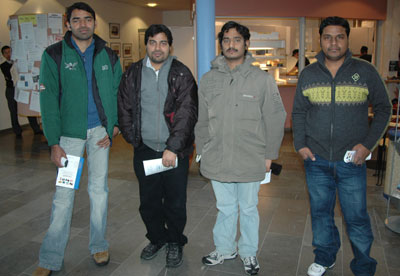 Just
as we were leaving the Dept. of Technology building we happened
to come across four Indian Masters students – a common
scene nowadays at Kalmar University. They all come
from Hyderabad in South India, and study at the same Masters
programme in Creative Digital Technology. We had a short chat and discussed
their experiences, mostly positive, from studying and living in
Kalmar. They are seen on the photo to the right – from the
left:
Bettenki Narotham Reddy, Sri
Sriram, Balusu Surekh Kumar and Doppaludi
Sudhakar Babu.
Just
as we were leaving the Dept. of Technology building we happened
to come across four Indian Masters students – a common
scene nowadays at Kalmar University. They all come
from Hyderabad in South India, and study at the same Masters
programme in Creative Digital Technology. We had a short chat and discussed
their experiences, mostly positive, from studying and living in
Kalmar. They are seen on the photo to the right – from the
left:
Bettenki Narotham Reddy, Sri
Sriram, Balusu Surekh Kumar and Doppaludi
Sudhakar Babu.
Baltic Business School
– see also http://www.sasnet.lu.se/baltic.html
In the afternoon we moved over to the Baltic Business
School, located in a modern building in the northeastern part of
Kalmar, close to the abutment for the Öland bridge. There
we had a meeting with Prof. Hans Jansson and
the researchers Joachim
Timlon and Mikael Hilmersson for
an informal orientation about the activities at BBS with relevance
for Asia and South Asia.
Prof.
Jansson is a long time specialist on Swedish business in India
and China, previously based at Lund
University, and at the School of Economics and Commercial Law,
Göteborg University, before joining the Baltic Business School
at the University of Kalmar. He has worked with several
research projects relating to India, many of them in collaboration
with Prof. Deo Sharma at the Department
of Marketing and Strategy, Stockholm School of Economics.
But since 2002, Hans Jansson is building up courses and research
at BBS in Kalmar. A one year Master’s Programme called Growth
through Innovation and International Marketing is currently
attracting students from 15 different countries including South
Asia.
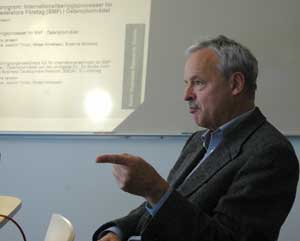 Hans
Jansson (photo to the right) is also heading the Baltic Business
Research Centre with 14 researcher (including 5 doctoral students).
The general focus is the Baltic Sea Region and the new economy.
The main thrust is now on small and medium sized firms doing business
in Eastern Europe and China and firms from there doing business
in northern Europe, which they see as a ‘third wave’ of
internalisation of business enterprises since the start in the
18th century.
Hans
Jansson (photo to the right) is also heading the Baltic Business
Research Centre with 14 researcher (including 5 doctoral students).
The general focus is the Baltic Sea Region and the new economy.
The main thrust is now on small and medium sized firms doing business
in Eastern Europe and China and firms from there doing business
in northern Europe, which they see as a ‘third wave’ of
internalisation of business enterprises since the start in the
18th century.
It signifies the final globalisation stage.
The emphasis
is on innovation and international marketing strategies, using
a network approach to the study of the growth and development of
firms. Other projects deal with ‘Strategies
for Regional Development and Growth’ and ‘Institutions
and Democracy in Central and Eastern Europe.’
A very concrete and important business venture in this regard is the build up of a Chinese trading centre in Kalmar, which is about to open later this year. The plan is that about a 1000 Chinese firms will be represented in the export market hall in Kalmar and sell their products all over Northern Europe. BBS has been involved with this venture since the start. More information.
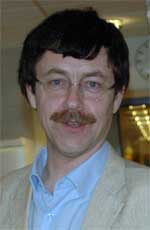 There is also a strong interest in doing
research on Indian business, but so far no funding has been secured
for such projects.
There is also a strong interest in doing
research on Indian business, but so far no funding has been secured
for such projects.
At the end of our visit, we got the chance to listen to Dr. Ingemar Ottosson (photo to the right), a lecturer in History from Kristianstad University, who gave a very nice popular lecture in an ongoing series of lectures about China. He talked about ‘The Swedish East-India Company’ and its formidable financial success in the 18th Century. The well attended lecture in the BBS auditorium was broadcasted to a number of TV-screens in the Kalmar regions, which also attracted a sizeable audience.
SASNET - Swedish South Asian
Studies Network/Lund University
Address: Scheelevägen 15 D, SE-223 70 Lund, Sweden
Phone: +46 46 222 73 40
Webmaster: Lars Eklund
Last updated
2009-09-07
